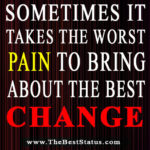By: Greg on March 15, 2018
“Can we change the world? Well, who knows? Probably not. But we can perhaps, just perhaps, make it a little better by living godly lives as aliens and strangers in it.”1 says Greg Gilbert as he paraphrases James Hunter’s To Change the World: The Irony, Tragedy, and Possibility of Christianity in the Late Modern World.…
By: Mike on March 15, 2018
James D. Hunter’s To Change the World: The Irony, Tragedy, and Possibility of Christianity in the Late Modern World is book that gives Christians hope that their faithful presence can make a difference in a chaotic near end-times world culture. Hunter’s world changing model is not about power, politics, or religion. Instead, the author says…
By: Jake Dean-Hill on March 14, 2018
It appears that James Davison Hunter, author of To Change the World: The Irony, Tragedy, & Possibility of Christianity in the Late Modern World, may be somewhat biased against groups and organizations that are fighting for the rights of the marginalized in our country. In fact, he basically says that America has gone to “hell…
By: Kristin Hamilton on March 13, 2018
If you know me, chances are that you have gathered that my social and political leanings are a BIT left of center. Being a “liberal” in a conservative family and church tradition can easily put me into an “us vs. them” mindset if I’m not careful. In order to keep my mind and heart more…
By: Jennifer Dean-Hill on March 13, 2018
When we consider shaping church culture, it is advantageous to view it as an emergent system, created as the result or outcome of all the parts coming together. “Emergent systems exist when different elements come together and produce something that is greater than the sum of their parts.”[1] For instance, “a marriage is an emergent…
By: Stu Cocanougher on March 13, 2018
 Several weeks ago, I began listening to the Audiobook The Social Animal: The Hidden Sources of Love, Character, and Achievement by David Brooks. Brooks is a cultural commentator and a write for The New York Times. As I began listening to The Social Animal, I was intrigued by its design. Brooks had compiled a massive…
Several weeks ago, I began listening to the Audiobook The Social Animal: The Hidden Sources of Love, Character, and Achievement by David Brooks. Brooks is a cultural commentator and a write for The New York Times. As I began listening to The Social Animal, I was intrigued by its design. Brooks had compiled a massive…
By: Trisha Welstad on March 10, 2018
“What is your calling?” This is a normal question to college and seminary students. As they are in the process of education toward a degree, they are also in a space of vocational discernment. Ideally their discernment includes internships where they glean experience to enliven their education through practical scenarios to taste and see whether…
By: Kyle Chalko on March 9, 2018
The title is offensive: Jesus the capitalist. Even for someone who is proud to be American, it is painful to see Jesus boiled down into a narrow ideological and political party. Jesus the Socialist, and Jesus the Communist don’t seem to work either.[1] This relevant tension between religion and politics is part of what makes…
By: Greg on March 9, 2018
“Our puritan background has allowed about half the population to want to work hard and the other half to want a hand out.” said a friend of mine this week as we discussed Max Weber’s book Protestant Ethics and the Spirit of Capitalism.1 Weber asserts that capitalism and the economic growth of the west has…
By: Mike on March 8, 2018
Max Weber’s The Protestant Ethic and the Spirit of Capitalism is considered to be one of the most controversial, canonical, and renowned 100 year works that foretells the Protestant influence in the creation and development of modern capitalism. Parsons describes Weber as “one of the most eminent empirical analysts of society of his time.”[1] I…
By: Jason Turbeville on March 8, 2018
In the past few weeks we have been reading books that were a challenge to me, not so much because they were difficult reads, but up until last week, I had a very hard time connecting with the books. Mainly because I have a hard time connecting with socialism as a viable method of government.…
By: Stu Cocanougher on March 8, 2018
 It happened at the gym. I had just hopped on an exercise bike, started moving the pedals and began to read the next book from my Doctor of Ministry reading list. The book was Leadership Pain by Samuel R. Chand. Now, even though this book had a name that was attractional as “How to Make…
It happened at the gym. I had just hopped on an exercise bike, started moving the pedals and began to read the next book from my Doctor of Ministry reading list. The book was Leadership Pain by Samuel R. Chand. Now, even though this book had a name that was attractional as “How to Make…
By: Jean Ollis on March 8, 2018
It’s an easy stretch to apply Weber’s The Protestant Ethic and the Spirit of Capitalism to the world refugee crisis. It is another piece of the leadership and global perspectives learning puzzle which is heavily focused on globalism and capitalism this semester (with a good dose of sociology throughout). As noted in Heath and Potter’s…
By: Chip Stapleton on March 8, 2018
This week we read the book Leadership Pain: The Classroom for Growth by Samuel Chand. I initially misread the title as Leadership PLAN which lead to a few minutes of confusion, to be sure, but really wouldn’t have been that far off. Chand is essentially proposing that to lead is to experience pain and, in fact, your…
By: Jay Forseth on March 8, 2018
Max Weber’s The Protestant Ethic and the Spirit of Capitalism proposed that because Calvinists believe in predestination, they developed a deep psychological need for clues about whether a person was actually saved. Therefore, the author asserts Calvinists came to value profit and material success as signs of God’s favor. [1] Supposedly, the Methodists, Baptists and others had…
By: Shawn Hart on March 8, 2018
Isaiah 65:17-23 (NKJV) 17 “For behold, I create new heavens and a new earth; And the former shall not be remembered or come to mind. 18 But be glad and rejoice forever in what I create; For behold, I create Jerusalem as a rejoicing, And her people a joy. 19 I will rejoice in Jerusalem,…
By: Mark Petersen on March 8, 2018
One of the most profound and surprising days of my life was a day in 2008 which I spent touring the Vatican Museums with art historian Elizabeth Lev. Walking through the museums, she offered compelling insights and thoughtful interpretations of the frescos, adornments, murals, tapestries, mosaics, and statuary flagrantly littered throughout the sacred spaces of…
By: Dave Watermulder on March 8, 2018
It’s an intimidating book, isn’t it? We’ve all heard of it, we’ve all talked about it, and it’s a cultural reference point. The Protestant Ethic and the “Spirit” of Capitalism by Max Weber has generated enormous scholarship, literary-critical response, as well as discussion within popular culture. And yet, this is a book that I had…
By: Chris Pritchett on March 8, 2018
One of the common phrases that many mothers say to their children when they act out is, “That was uncalled for.” That’s an interesting phrase, isn’t it? “Uncalled for.” It’s as if there is something outside of ourselves that calls us to be who we ought to be, and when we are acting apart from…
By: Jennifer Williamson on March 8, 2018
Weber’s Protestant Ethic and the Spirit of Capitalism intrigues me. I understand why this work has stood the test of time, for though his empirical arguments seem to be rooted in personal observation, his theoretical explanations of the correlations between Protestantism and Capitalism resonate and draw the modern reader into the conversation. I found myself…
 Several weeks ago, I began listening to the Audiobook The Social Animal: The Hidden Sources of Love, Character, and Achievement by David Brooks. Brooks is a cultural commentator and a write for The New York Times. As I began listening to The Social Animal, I was intrigued by its design. Brooks had compiled a massive…
Several weeks ago, I began listening to the Audiobook The Social Animal: The Hidden Sources of Love, Character, and Achievement by David Brooks. Brooks is a cultural commentator and a write for The New York Times. As I began listening to The Social Animal, I was intrigued by its design. Brooks had compiled a massive…
 It happened at the gym. I had just hopped on an exercise bike, started moving the pedals and began to read the next book from my Doctor of Ministry reading list. The book was Leadership Pain by Samuel R. Chand. Now, even though this book had a name that was attractional as “How to Make…
It happened at the gym. I had just hopped on an exercise bike, started moving the pedals and began to read the next book from my Doctor of Ministry reading list. The book was Leadership Pain by Samuel R. Chand. Now, even though this book had a name that was attractional as “How to Make…